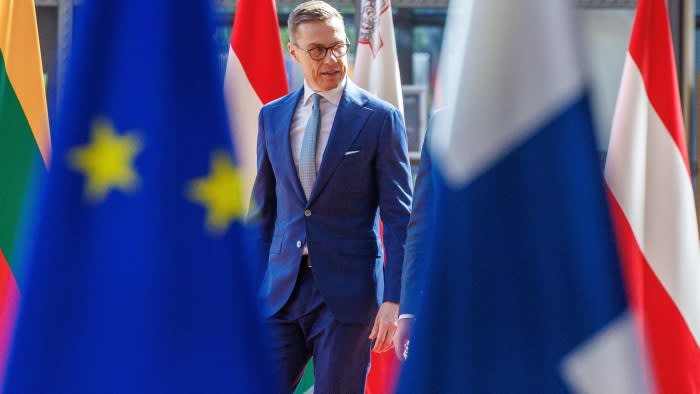Some content could not load. Check your internet connection or browser settings.
The EU is funding authoritarian countries on its periphery to curb arrivals to the bloc, although irregular migration figures are well below 2016’s peak. Read our deep dive into the human cost of Europe’s increasingly draconian migration policies.
Hold it
Eurozone inflation has fallen to within a fraction of the European Central Bank’s 2 per cent target, and the economy has ground to almost a complete standstill.
So why, asks Martin Arnold, is the ECB expected to leave interest rates at a record high when its governing council meets today?
Context: The ECB has kept its benchmark deposit rate at an all-time high of 4 per cent since last September. Senior policymakers have said they are likely to start cutting rates as early as their next meeting on June 6 if price pressures keep cooling as expected.
ECB president Christine Lagarde said last month she expected it to “make policy less restrictive” as long as the data coming in the next eight weeks show inflation still falling towards its target.
There are three factors that make ECB rate-setters nervous to act sooner.
The first is that while annual headline inflation fell to 2.4 per cent in March, this mainly reflects falling energy and fresh food costs and weak growth in goods prices. Services inflation, however, has been stuck at an uncomfortably high 4 per cent for five months.
The second worry is wage growth, which eased in the fourth quarter. The ECB wants this to continue in 2024, but early signs from Germany are troubling: its annual 9.7 per cent rise in negotiated wage growth including bonuses in March was almost the highest since 2011.
The final fly in the ointment is the US Federal Reserve.
Inflation has overshot forecasts in the US for three months, prompting investors to bet the Fed may not start cutting rates until November. This is unlikely to stop the ECB from lowering borrowing costs, but it will make it more uneasy about going first.
What to watch today
Eurogroup meets in Luxembourg.
Central European leaders meet for the Three Seas Summit in Vilnius.
Now read theseRecommended newsletters for you
Britain after Brexit — Keep up to date with the latest developments as the UK economy adjusts to life outside the EU. Sign up here
Chris Giles on Central Banks — Your essential guide to money, interest rates, inflation and what central banks are thinking. Sign up here
Are you enjoying Europe Express? Sign up here to have it delivered straight to your inbox every workday at 7am CET and on Saturdays at noon CET. Do tell us what you think, we love to hear from you: europe.express@ft.com. Keep up with the latest European stories @FT Europe
Source link : https://www.ft.com/content/e96b009e-5359-4a0c-932e-373ce3a78f2d
Author :
Publish date : 2024-04-10 07:00:00
Copyright for syndicated content belongs to the linked Source.
